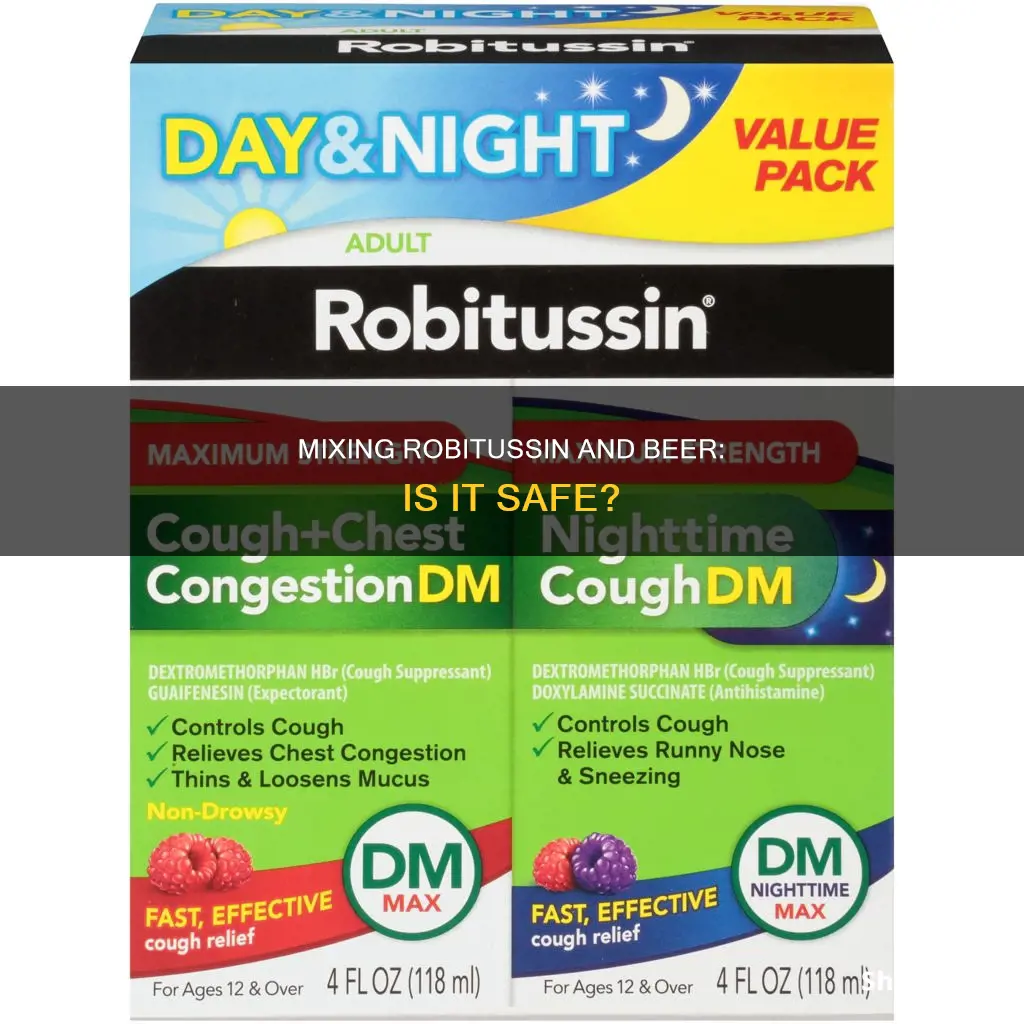
Drinking alcohol while taking Robitussin is not recommended, as it can lead to serious health problems. Robitussin is a popular brand of cough suppressant, and some of its products contain dextromethorphan (DXM), a central nervous system (CNS) depressant that can cause feelings of relaxation and sleepiness. When combined with alcohol, a CNS depressant with similar effects, the side effects of both substances are amplified, increasing the risk of overdose, respiratory depression, brain lesions, and even death. While some may assume that over-the-counter drugs like Robitussin are safe, mixing them with alcohol can have dangerous and unpredictable consequences. Therefore, it is crucial to heed the warnings on medication labels and seek professional advice when in doubt.
| Characteristics | Values |
|---|---|
| Drinking beer after taking Robitussin | Not recommended |
| Robitussin ingredients | Dextromethorphan (DXM), Guaifenesin |
| Dextromethorphan (DXM) and alcohol effects | Increased risk of toxicity, overdose, and serious health problems |
| Dextromethorphan (DXM) overdose symptoms | Difficulty speaking, confusion, vision and coordination problems, drop in body temperature, hallucinations, mania, paranoia, increased heart rate |
| Dextromethorphan (DXM) and alcohol combined effects | Increased dizziness, drowsiness, impaired coordination, judgment, and psychomotor skills, severe nausea, and vomiting |
| Dextromethorphan (DXM) and alcohol interaction | Both are central nervous system (CNS) depressants, additive side effects, increased risk of overdose |
| Robitussin with codeine and alcohol | Profound sedation, respiratory depression, coma, and death |
What You'll Learn
- Robitussin DM and alcohol can cause additive CNS depression and/or impaired judgment, thinking, and psychomotor skills
- Robitussin and alcohol can increase the risk of overdose
- Mixing Robitussin and alcohol can lead to respiratory depression
- Robitussin and alcohol can cause severe nausea and vomiting, sometimes lasting for hours
- The effects of Robitussin and alcohol can last for several days

Robitussin DM and alcohol can cause additive CNS depression and/or impaired judgment, thinking, and psychomotor skills
Drinking alcohol with dextromethorphan (DXM), a common ingredient in Robitussin cough syrups, increases the chance of toxicity and can cause serious health problems. Robitussin is a popular brand for cough suppressants, and some of their products contain DXM. According to the National Capital Poison Center, more than 6,000 people visit emergency rooms annually due to DXM toxicity or overdose.
DXM is a cough suppressant that has been available since 1958 and is currently present in more than 100 different cough and cold products. It works by curbing the cough reflex in the brain to reduce coughing. While DXM is generally safe at recommended doses, misuse can occur when larger doses are taken to achieve a "high" or hallucinogenic effect.
When DXM is combined with alcohol, it can lead to additive central nervous system (CNS) depression. This means that the combined effects of both substances on the CNS are greater than the sum of their individual effects. As a result, individuals may experience impaired judgment, thinking, and psychomotor skills.
To manage this interaction, patients receiving CNS-active agents like Robitussin DM should be warned of the potential risks and advised to avoid or limit alcohol consumption. They should also be cautioned to avoid hazardous activities that require mental alertness and motor coordination until they understand how the medication affects them.
Understanding Beer Bikes: How Do They Work?
You may want to see also

Robitussin and alcohol can increase the risk of overdose
Robitussin is a popular brand for cough suppressants. Some, but not all, of their products contain dextromethorphan (DXM). DXM is the most popular cough suppressant sold in the United States and has been around since 1958. It works by curbing the cough reflex in the brain to reduce coughing.
Drinking alcohol with DXM increases the chance of toxicity and can cause serious health problems. Both substances have depressant effects on the brain, dulling the senses and slowing down coordination and judgment. Mixing the two can also cause severe nausea and vomiting, sometimes lasting for hours.
The effects of DXM and alcohol can last for several days, depending on the person and the drug mix. The side effects of DXM are stronger when taken with alcohol, and the risk of overdose increases. According to the National Capital Poison Center, more than 6,000 people visit emergency rooms from DXM toxicity or overdose annually.
DXM is commonly misused with alcohol, especially among teens. "Robo-tripping" is a slang term for misusing DXM cough medicine, sometimes mixing it with soda or candy to mask the unpleasant taste.
It is important to note that the maximum daily recommended dose of DXM is 120 milligrams (mg) taken in divided doses. At recommended doses, DXM is safe with few side effects. However, when misused, larger doses are taken to achieve a "high" or hallucinogenic effect.
To summarize, mixing Robitussin and alcohol can increase the risk of overdose due to the additive central nervous system depression, impairment of judgment, and potential for respiratory failure caused by the combination of these substances. It is advisable to avoid alcohol consumption while taking any cough medication, including Robitussin, to minimize the risk of adverse health consequences.
UK Beer Laws: Drinking While Driving
You may want to see also

Mixing Robitussin and alcohol can lead to respiratory depression
Dextromethorphan (DXM) is a common ingredient in Robitussin cough syrups. It is a central nervous system (CNS) depressant that causes feelings of relaxation, sleepiness, and a euphoric feeling. Alcohol is also a CNS depressant, and when these two substances are mixed, it can lead to a more intense impact on the body.
Mixing Robitussin and alcohol can cause additive side effects, increasing the risk of overdose. One of the most severe consequences of this combination is respiratory depression, or slowed breathing. This can be life-threatening, and in severe cases, it can lead to death from respiratory failure.
The combination of Robitussin and alcohol can also cause other severe side effects, including brain lesions that can lead to memory and behavioural problems, as well as an increased risk of serotonin syndrome, which can raise blood pressure and heart rate to unsafe levels.
It is important to note that the effects of mixing Robitussin and alcohol can be unpredictable and may vary depending on individual factors such as existing health problems and the use of other drugs. Therefore, it is strongly advised to avoid mixing Robitussin and alcohol to prevent the risk of serious health complications.
Beer Gas: How Does It Work?
You may want to see also

Robitussin and alcohol can cause severe nausea and vomiting, sometimes lasting for hours
Robitussin is a popular brand for cough suppressants, and some of their products contain dextromethorphan (DXM). DXM is a central nervous system (CNS) depressant that causes feelings of relaxation, sleepiness, and euphoria. Alcohol has a similar effect on the body, and mixing two CNS depressants is very dangerous. When combined, Robitussin and alcohol can cause additive central nervous system depression, which can impair judgment, thinking, and psychomotor skills. This combination can also cause severe nausea and vomiting, sometimes lasting for hours.
The effects of Robitussin and alcohol can be unpredictable and may last for several days. In addition to nausea and vomiting, other possible side effects include dizziness, drowsiness, impaired coordination, and increased heart rate. The risk of overdose is also increased when these substances are mixed.
It is important to note that some cough medications, including certain Robitussin products, contain a small amount of alcohol. Therefore, consuming additional alcohol with these medications can enhance the effects and increase the risks described above. It is generally recommended to avoid consuming alcohol while taking any cough medication.
If you are taking Robitussin or any other medication, it is always advisable to consult your doctor or pharmacist about possible interactions with alcohol. They can provide personalized guidance based on your specific medication, health status, and other factors.
Yogurt and Beer: A Safe Pairing or Not?
You may want to see also

The effects of Robitussin and alcohol can last for several days
Drinking alcohol with Robitussin can be dangerous. Robitussin is a brand of cough suppressant that contains dextromethorphan (DXM), which is known to have a dangerous interaction with alcohol. Both substances have a depressant effect on the brain, dulling the senses and slowing down coordination and judgment. Mixing the two can lead to severe nausea and vomiting, which may last for hours.
It is important to note that Robitussin may also contain other ingredients such as acetaminophen, antihistamines, and guaifenesin, which can increase the risk of side effects. Therefore, it is crucial to read the labels carefully and consult a doctor or pharmacist before consuming any medication, especially when mixing it with alcohol.
To avoid the risks associated with mixing Robitussin and alcohol, it is advisable to refrain from consuming alcohol while taking this medication.
Beer and Pre-Workout: A Safe Combo?
You may want to see also
Frequently asked questions
No, it is not advised to drink alcohol after taking Robitussin. Drinking alcohol with dextromethorphan (DXM), a common ingredient in Robitussin, increases the chance of toxicity and can cause serious health problems.
Both DXM and alcohol are central nervous system (CNS) depressants, which means they cause relaxation, sleepiness, and a euphoric feeling. Mixing depressants is very dangerous because their combined side effects can increase the risk of overdose, respiratory depression, and even death.
Signs of overdose include nervousness, restlessness, upset stomach, diarrhea, constipation, difficulty speaking, confusion, trouble with vision and coordination, a dangerous drop in body temperature, hallucinations, mania, paranoia, and increased heart rate.
There is no hard and fast rule about how long to wait after taking Robitussin before consuming alcohol. It is best to consult a pharmacist or healthcare provider for individualized guidance based on the medication, weight, and gender.
Yes, there are alcohol-free cough syrup formulations available, such as alcohol-free Tussin-DM or Safe-Tussin DM. These options are recommended for those seeking to avoid alcohol in their medication.







